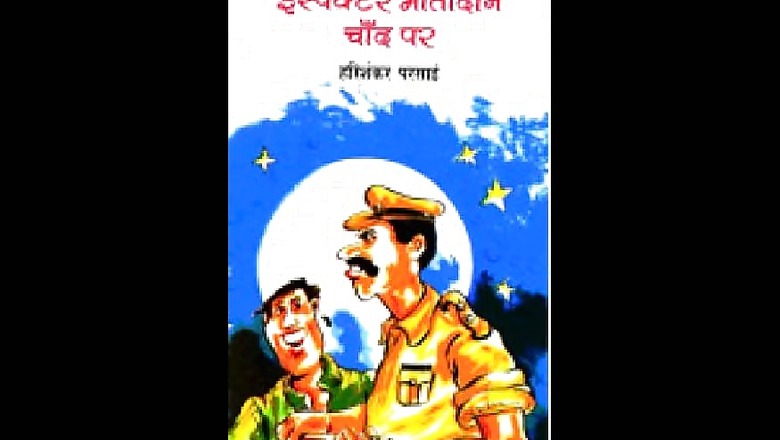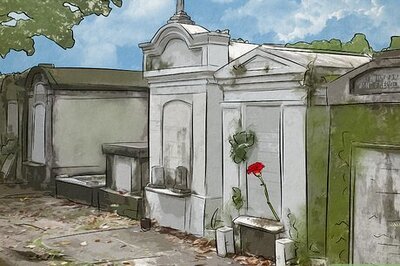
views
How would Inspector Matadeen have handled a novel coronavirus pandemic on the moon?
Matadeen is the lead character in Harishakar Parsai’s short story Inspector Matadeen Chand Par published in 1970 in an anthology titled A Shivering Republic.
The protagonist is a police officer on deputation to Earth’s all-weather celestial ally under a special cultural exchange program.
In his inimitable deadpan yet scathing satire on Indian police system, Parsai dissects Matadeen’s repertoire of means, modes and methods of investigating a crime. During his short tenure on Moon, the inspector works to inculcate some of these very habits in his brother officers.
While reading Inspector Matadeen Chand Par in Covid-19 battered Delhi, one wonders if Matadeen would have admitted to community transmission of the pathogen on Earth’s only satellite. Especially if there were more than 3 lakh confirmed Covid-19 positive cases on the Moon by the second week of June.
Experts in India have been insisting for a while now that the government should acknowledge we have entered stage three of the pandemic. Epidemiologists who have spent their lives studying the lives of RNA and DNA mostly concur that now it is beyond our means to track and trace new transmissions. And resources now should instead be channelised towards ramping up healthcare facilities to take care of severe patients.
Going by whatever little we know of Matadeen from the short profile captured by Parsai half a century back, the officer was a stickler to rules. Even in declaring a state of community transmission, he would possibly have strictly gone by the protocol.
India is a country which runs on protocols. Sitting arrangement at every function is according to the prescribed protocol. So be it with community transmission.
Because veracity of the data pouring in needs to be established by a committee. The committee will function according to the protocol. Like establishing the chain of transmission in a patient. And in case of a death, to verify if the deceased had indeed died of the novel coronavirus.
In counting Covid-19 deaths, one also needs to factor in if the patient had any co-morbidities. The process -- though may seem a little tedious -- would help figure out whether the patient had indeed died of any existing health condition or because of the virus per se. Or both.
A relative in Delhi was tested positive for Covid-19 when he complained of breathing trouble in the first week of May. Three weeks later and cleared of home quarantine, the 33-year-old suddenly developed respiratory complications and passed away at a hospital. His family was told the patient had tested negative for the Covid-19 RNA just hours before he breathed his last. So technically it was not a Covid-19 death.
Now every life matters. Be it on the Moon or the Earth. And for heaven’s sake, no one should take it lightly.
Say if we were to make a comparison 10 years hence, how would researchers draw a distinction between a performer and an idler? Or suppose in 2025, if there are elections in our solar system, how would people separate wheat from the chaff? The Covid data, meticulously sifted and collated, would tell the voters which governance model to root for.
Matadeen’s sojourn to Moon isn’t just a dissection of the Indian police system. Or an individual. It is about the system itself which has acquired a character of its own. Individuals are a mere cog in that giant wheel which has evolved over the years as a veritable arm of the state.
This wheel has acquired an inertia of its own. It turns out of its own volition. Suo moto. It confirms to processes and procedures passed on from one generation to other. Like a baton in a relay race. Only this one race just never seems to end.
As the virus spread outside China, experts kept shouting at the top of their voice: trust and transparency can help weather this storm.
They re-iterated: government and authorities must communicate in a way that people start to believe in them. So that in absence of any pharma intervention -- and there is none thus far to Covid-19 -- people adhere to prescribed lifestyle changes necessary to minimise the damage.
In the national capital today, the municipality is contradicting mortality figures notified by the state government. And vice versa. Similar reports of under-reporting in Covid-19 deaths have been flagged in other parts of the country.
The apparent causality in this conflict of interest is trust. People’s trust on authorities and information provided, which for any country now is the key in navigating through the crisis.
Matadeen’s story ends with the Prime Minister of Moon pleading with his Indian counterpart to repatriate the police officer to the home cadre at the earliest.
It is not Matadeen’s fault that he dealt with the crime scene on the Moon in a certain way. He responded to the situation as per his training.
In the last three months, there have been stories galore of exemplary courage displayed by both police and civil personnel at the forefront of the fight against the deadly pathogen. These people have worked tirelessly at a great personal risk and to their families.
System has responded with its own countervailing centripetal force. The ensuing push and pulls have not made the task of administrators any less easy.
Five years before Parsai published A Shivering Republic, Uttar Pradesh Police prepared a dossier for the then state home minister Chaudhary Charan Singh. Parsai’s muse in Matadeen was writ large on every page of this document.
Burglaries in the state by 1960 -- the report said -- had come down by more than 85 percent from 81,488 registered cases in between 1905 to 1909. This was no mean achievement considering “tremendous” growth in population for the same period.
The report was candid in attributing the sharp fall to “standard method of concealment” of crime like: writing report on plain piece of paper or general diary and not registering any case; complaint is written in a language that no case is made out; and finally un-dated report is written but registered if ‘something crops up from some corner’.
No one knows whether this rarest of the rare self-indictment by UP police ever saw the light of the day. But it did demonstrate in unequivocal terms that data management and under-reporting of crime was perhaps as old as the department itself.
It seems the department imbibed to an unwritten dictum: fewer FIRs mean less crime. More FIR means more crime. No FIR meant zero crime.



















Comments
0 comment